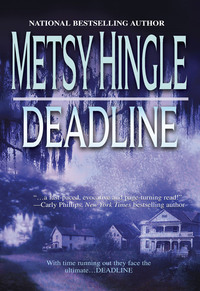Kitap dosya olarak indirilemez ancak uygulamamız üzerinden veya online olarak web sitemizden okunabilir.
Kitabı oku: «Deadline», sayfa 2
“Did it ever occur to you that maybe the reason you let things reach that point was because you knew it’s what the senator wanted?”
“It wasn’t my grandfather’s mistake. It was mine.” Although the senator had introduced her to Jonathan and hadn’t hidden the fact that he’d welcome the up-and-coming attorney as a grandson-in-law, he hadn’t forced her to go out with the man. “As you pointed out, no one held a gun to his head and forced him to go out with me.”
“So I take it the senator isn’t giving you grief for breaking up with golden boy?”
“He’s not happy about it, but he’s accepted it,” Tess replied. And she hoped that was true. Her grandfather had been furious with her over her decision to end things with Jonathan. If there was one thing she’d learned in the years since she’d come to D.C. as a four-year-old to live with him and her grandmother, it was that her grandfather did not like it when things didn’t go according to his plan—be it on Capitol Hill or in his family. Her turning down Jonathan’s proposal was not part of his plan. But marrying the man was not part of her own plan.
“So no more schemes by the senator to throw you and Johnny together?”
“I made it clear to my grandfather that I’m not going to change my mind,” Tess informed her. The final straw had occurred ten days ago when she’d arrived for her weekly dinner with her grandparents and had been advised that Jonathan would be joining them. Her grandmother had been clearly distressed by the senator’s announcement, but Tess had been furious with him for, once again, trying to run her life. As a result, she had left the restaurant, leaving him to explain her absence to Jonathan.
“I can imagine how that went over. I got the impression at that charity dinner last month that the senator had earmarked Johnny boy as his future grandson-in-law.”
“He may have, but it wasn’t his decision to make. It was mine, which is what I told him.” The day after the scene in the restaurant, she’d threatened to sever all contact with her grandfather if he continued to interfere in her personal life.
Ronnie arched one perfectly groomed eyebrow. “And what was the senator’s response to that?”
“Let’s just say, he wasn’t thrilled with my decision.” The truth was, she and her grandfather had barely spoken since that night. “And I’d really like to drop the subject.”
“Sure,” Ronnie told her as she slathered butter on another cracker. She paused, looked up at Tess. “So if it’s not the senator or Johnny causing you to lose your beauty sleep, what or who is?”
“Ronnie,” Tess said, making no attempt to hide her exasperation.
“Two chicken specials,” the waitress declared and Tess was grateful for the interruption. After the young woman removed the salad plate, she placed the plate of grilled chicken with a rice pilaf in front of Ronnie. She paused at the sight of Tess’s soup, which had barely been touched. “Something wrong with the soup?”
“No. It’s fine, but I’ve had enough. You can take it,” Tess told her.
She added the soup plate and cup to her tray and promptly served Tess her own plate of chicken. “You ladies let me know if you need anything else,” the woman declared and hustled off in the direction of the kitchen.
“This looks good,” Tess said as she picked up her fork.
“If that’s your subtle way of ignoring my question, you should know me well enough by now to realize that I’m not going to stop hounding you until you tell me what’s wrong.” When she said nothing, Ronnie asked, “Is it work, Tess? I know sticking you with Kip on that last assignment wasn’t fair, but I didn’t have a choice. The jerk’s uncle wields a lot of power around here.”
“It doesn’t have anything to do with work. It’s personal.”
Ronnie paused, and a concerned look came into her hazel eyes. “All right, Tess. I’ll back off. But as your friend, I have to tell you that I’m worried about you. I’ve never seen you this stressed out before—not even when all that crap was going on about your father’s suicide. Just so you know, if you need to talk, I’m here.”
“Thanks, Ronnie. I appreciate it.” Yet Tess wasn’t at all sure she wanted to share with anyone the thoughts that had been running through her head since she’d received that phone call. But mostly, she wasn’t sure whether she wanted to voice aloud what had been really troubling her—the idea that perhaps someone other than Jody Burns might have been responsible for her mother’s murder.
Chapter Two
“I’m so glad you called,” Elizabeth Abbott said that Saturday morning when she greeted Tess at the front door of the elder Abbotts’ town house. “I do hate it so when you and your grandfather are at odds.”
“I know, Grams,” Tess said as she returned her hug. She drew back a fraction. “And I’m sorry that you’re the one who always gets caught in the cross fire.”
Her grandmother reached up and brushed the hair back from Tess’s face. “Don’t worry about me, dear. I’m a lot stronger than you think.”
“I’ve never doubted your strength,” Tess told her and she meant it. Her grandmother was a strong woman in her own way, having handled the loss of her only child, battled breast cancer and remained married to a strong-willed man like Senator Theodore Abbott for more than fifty years. “But sometimes I don’t understand how you can put up with Grandfather when he gets in one of his moods.”
“By one of his moods, I take you mean his being out of sorts because things haven’t gone as he planned?” her grandmother asked, a twinkle in her blue eyes as the two of them headed toward the breakfast room.
“Yes,” Tess replied. In truth, out of sorts was a mild description. Her grandfather was dictatorial and often nasty when he failed to get his way. She took a seat at the glass-and-rattan table where colorful place mats had been laid out with coffee cups and sterling.
“It’s called marriage, dear. When you marry someone you take them—warts and all.” She poured Tess a cup of coffee. “He’s a good man, Tess. He’s done some remarkable things in his life. And he only wants what’s best for you.”
“I know, Grams. But that doesn’t give him the right to try to manipulate me and decide who I should marry.”
Her grandmother took a seat at the table next to her. “He just doesn’t want you to make a mistake.”
“You mean the way my mother did?” Tess asked. “Maybe marrying Jody Burns was a mistake in Grandfather’s eyes. But it was her choice. Not his. And whomever I marry, it’s going to be my choice, not grandfather’s.”
“You’re so stubborn and righteous. Even more so than your mother was.” Her grandmother sighed. “Sometimes, I wonder if things would have turned out differently if you and your mother had taken after me more instead of your grandfather.”
With the morning light spilling in from the window across her grandmother’s face, Tess noted the lines bracketing her eyes. The tasteful short coif of hair that had once been blond had given way to a lovely silver. Despite her seventy-plus years, Elizabeth Abbott’s skin remained smooth, her face lovely. “You’re stubborn in your own quiet way, Grams.”
“Yes, I suppose I am,” she conceded. She reached over and patted Tess’s hand. “So, are you going to tell me why you needed to talk to your grandfather and me?”
Tess was tempted to tell her grandmother, to confide in her all the questions that had been running through her head since receiving that phone call and the decision she’d finally reached. “I think maybe it’ll be better if I talk to the two of you together. When will Grandfather be home?”
“He had an early golf game with Senator Wilke. I expect him home any minute now.”
Any minute turned out to be nearly an hour later. And when her grandfather entered the breakfast room, the entire house seemed more alive. “Tess, I wasn’t expecting to see you here,” her grandfather said gruffly, and Tess knew from his tone that he was still miffed at her over walking out on him at dinner more than a week ago.
“Tess called after you left this morning and asked if she could come by, Theo,” her grandmother explained as she poured her husband a cup of coffee before resuming her own seat.
A big man with a head of thick silver hair and skin darkened by hours spent golfing, her grandfather remained a formidable man even at the age of seventy-five. Ignoring the coffee, he popped a stick of the cinnamon-flavored gum that he favored inside his mouth. A onetime smoker, Theodore Abbott had kicked the habit some twenty-seven years ago, but he had taken to chewing gum. Since then, he was never without a packet of gum stuffed inside one of his pockets. Taking the silver foil from the gum, he proceeded to tie it into a knot. It was a ritual that she had watched her grandfather perform thousands of times. After a moment, he said, “If you’ve come to apologize for your rude behavior last week at dinner, you should know that I’m still quite upset with you, young lady. Your grandmother and I brought you up to behave better. You also owe Jonathan an apology.”
“Jonathan and I have already spoken, Grandfather.”
He pitched the knotted wrapper beside his coffee cup and sat back in his chair. “I’m pleased to hear that,” he said, sounding somewhat mollified.
“Don’t be, because I haven’t changed my mind about marrying him and I didn’t come here to apologize for walking out on your little setup at the restaurant to get us back together.”
He scowled. “Then why are you here?” he demanded.
“To let you know that I’m planning to ask the station for some time off.”
“Why, I think that’s an excellent idea, Tess,” her grandmother said, cutting the tension that permeated the air. “I was just telling your grandfather that you’ve been working too hard. It’ll do you good to take a little vacation.”
“Your grandmother’s right. Perhaps a few weeks’ rest will improve your disposition.”
“I won’t be taking a vacation. But I will be traveling to Mississippi. I’ve been in touch with the prison where Jody Burns died. I’m not sure his death was a suicide. I intend to look into it and his murder trial.”
Her grandfather slapped his hand down on the table, rattling the coffee cups and silver. “You will do no such thing. I forbid it!”
“I wasn’t asking for your permission, Grandfather.” Tess stood. “I just wanted to let you both know where I’ll be so you don’t worry about me.”
“You expect us not to worry when it’s obvious that you’ve lost your mind?” her grandfather fired back.
“Calm down, Theo,” her grandmother soothed. “Remember what the doctor said about your blood pressure.”
“To hell with my blood pressure,” he shouted. His face turned bright red. “I would think you’d be glad that the man was dead. Need I remind you that he killed your mother? That you were the one who found him over her bloody body holding the weapon in his hand?”
Tess heard her grandmother’s gasp, saw the horror register on the older woman’s face. Tess looked back at her furious grandfather. “I was four years old. A child,” she reminded him. She had never seen Jody Burns following his conviction, and had long ago written him off as her father. But since that phone call, claiming his death hadn’t been a suicide and that someone else had been responsible for her mother’s murder, she had been plagued with questions. More importantly, she had begun to question her own memories of what had happened that night. “What if I was wrong about what I saw?”
“You weren’t wrong. He killed her,” her grandfather insisted.
“That’s what I intend to find out.”
And despite her grandfather’s angry protests and her grandmother’s dismay, Tess was determined to do just that.
“Okay, Tess, I need you to give me that sign-off again,” the sound engineer told her in the news studio the next day as she completed the edits on the piece she’d done on a local playwright.
“Reporting on ‘What’s New in Entertainment This Week’ for Channel Seven News, this is Tess Abbott.”
“That should do it,” the engineer advised her.
“Looks good. The guys upstairs are gonna like this one,” the cameraman told her.
“Let’s hope you’re right, Bobby,” she replied with a smile. She couldn’t help noticing Ronnie watching her, that worried look in her eyes again. It was a look she’d seen several times since their talk over lunch last week. She could only hope that telling Ronnie about her plans would go smoothly.
And there was no time like the present, Tess decided as she unclipped the microphone from her jacket. Dodging the booms of the cameras and lights, she sidestepped the trail of cables that snaked across the small studio where they’d been taping. She started over toward Ronnie, who was tossing out directions to the assignment editor, production assistant and technician.
Without even taking a breath, she turned her attention to the news anchor. “David, we’re going to lead with the story on the three-alarm fire downtown and move the president’s speech to second,” Ronnie instructed him while she continued to scribble notes that she handed off to her assistant. “We should be able to run Tess’s piece on the playwright near the end of the news hour, right after the weather.”
“Got it,” the news anchor replied. “I’ve reworked the copy some on the lead-in story, punched it up a bit.”
“Let me take a look,” Ronnie said and took the script from him.
Tess stood back and waited for Ronnie to finish. But in typical Ronnie Hill fashion she multitasked, flicking a glance up at her even as she scanned the script changes. “This looks fine. Go with it,” she said as she handed him back the script.
When the anchor left, Tess moved closer. “When you’ve got a few minutes, Ronnie, I’d like to speak with you.”
If she was surprised by the request, Ronnie gave no indication. “Now’s good for me. Why don’t we go to my office.”
Tess followed the other woman down the hall to the place where Ronnie spent the majority of her time. The room was a reflection of Ronnie—neat but lived in, and a testament to how busy she was. The mahogany desk was covered with stacks of papers, videotapes, folders and two phones. One wall was filled with framed awards and certificates interspersed with photographs—Ronnie with D.C.’s governor, Ronnie with a Hollywood celebrity, Ronnie receiving an award from the station’s president, Ronnie with the White House press secretary. Another wall was dominated by three television sets and another with an eclectic mix of watercolors that included a Monet copy and an abstract by a local artist. Still another wall featured a huge write-on calendar that was filled with information. Beside it was a graph charting the station’s ratings. A ficus tree added a splash of green in one corner and a potted marigold-colored mum brightened a corner table.
Evidently Ronnie read something in Tess’s expression because she paused at her desk and buzzed through on the intercom. “Patsy, I’d like you to hold my calls for the next thirty minutes.”
“Sure thing, Ronnie,” the assistant replied.
“Why don’t we sit over there,” Ronnie suggested, indicating the sitting area where a small navy couch and two covered chairs had been positioned around a coffee table that sported a hardcover picture book of Washington monuments, an art book and issues of the New York Times, the Washington Post and USA Today.
Tess chose one of the overstuffed chairs. Clasping her hands together, she wondered exactly where to begin. She opted to just be direct, “Ronnie, I—”
“Wait,” Ronnie said, holding up her hand. “If you’re here to bitch at me for sticking you with Kip on that school-bus story next week, let me tell you right now that it wasn’t my idea. The word came down from Stefanovich himself. According to him, we’re not giving his nephew enough camera time. Of course, I couldn’t tell him the little prick is an idiot and doesn’t know one end of the microphone from the other.”
Tess almost laughed at Ronnie’s frustration with the station manager’s nephew whom they had been asked to hire during the summer. An aspiring television reporter with a communications degree, Kip Edwards was pleasant enough and eager to be a part of the news team. Unfortunately, the man was a total klutz who could—and had—wiped out hours of work by just walking across a room. Whenever he was assigned to a story, the engineers safeguarded their equipment and the reporters their persons. Kip also came up short in the personality department—a fact that was apparent whenever he was on camera. As a result, no one was eager to work with him, and Ronnie was stuck with the unpleasant task of using him.
“Anyway, Stefanovich asked for a copy of the assignments and decided Kip should do the piece with you. I’m sorry, kiddo. My hands are tied. I’m afraid you’re stuck with him on this one.”
“I understand. But that’s not what I wanted to talk to you about. I need some time off. There’s something personal that I need to take care of.”
Ronnie seemed to relax a bit. She sat back on the couch, some of the stiffness leaving her shoulders. “Well, I don’t see where that should be any problem. David seems to be working out fine, and now that Angela’s back from her baby break, I can probably clear you for a few days at the end of next week.”
“I’m afraid I’m going to need more than a few days. Actually, a lot more.”
Ronnie narrowed her eyes. “How much more?”
“I’ve got a month of vacation time and sick leave due. I’d like to take it.”
“A month!” Ronnie whipped off her tortoiseshell glasses, pitched them to the table. “You’ve got to be kidding! You can’t honestly expect me to approve a month’s vacation for you. Not even the anchors get that much time off all at once.”
“I wouldn’t ask if it wasn’t important.”
“No. Absolutely not.” Ronnie stood up and began pacing about the room. “It’s out of the question. You’re my best reporter. I can’t have you taking off for a month.”
“It’s not impossible,” Tess argued. “You said yourself that David’s on board now and Angela’s back from maternity leave. So you’re fully staffed again.”
“We won’t be fully staffed if you’re out.”
“You’ve also got Kip,” Tess pointed out.
Ronnie glared at her and sat down again. “You’re not helping your case here, kiddo.” She shook her head. “No. There’s no way I can spare you for a month. A week maybe, but not a month.”
“Then I quit.”
“You can’t quit. You have a contract.”
“My contract’s up for renewal at the end of next month. I’ll ask the GM to release me early,” Tess told her, hating that it had come to this. She liked her job, liked Ronnie and the people she worked with, but she had to find out the truth. And to do that she was going to need time to go back to Mississippi. She stood. “I’m sorry, Ronnie.”
“Oh, stop with the dramatics and sit down.” Once Tess had done so, Ronnie said, “Now tell me what in the hell is going on and why you’re threatening to quit on me.”
“I don’t want to quit,” Tess told her. “But there’s something I have to do, something personal, and I need the time off to do it.”
“That’s it? That’s all the explanation you’re going to give me?”
“I told you. It’s personal.”
Ronnie leveled a “give me a break” look at her.
Tess sighed. “It has to do with my mother, about when she died. And about my father’s suicide,” Tess said finally.
“So that’s what’s been bothering you,” Ronnie said, and Tess suspected the remark was more to Ronnie herself. “Which I suppose is understandable. I mean, it hasn’t been all that long since that stuff happened with your father. I’m sure that whole suicide thing brought up some bad memories for you.”
“Yes.”
“But, kiddo, instead of taking off you should be keeping busy, and trying to put all that stuff out of your mind.”
“I can’t,” Tess told her.
Ronnie narrowed her eyes. “Wait a minute,” she said. “Have those dirtbags from the tabloids been hounding you again? Because if they have—”
“No. You know how this business is, everyone’s moved on to the next scandal and forgotten all about me and my family.”
“I would hope so,” Ronnie told her. “You poor kid. All that mess, then breaking up with Johnny and me loading you down with work. No wonder you’ve been having trouble sleeping. It’s a miracle that you haven’t been having nightmares.”
But there had been no nightmares. At least not in a very long time. That hadn’t always been the case. For months after her mother had been murdered, she did wake up screaming, unable to get the image of her father kneeling over her mother’s body, blood on his hands and shirt, the bloody bookend in his hand, out of her mind. But with time, the nightmares had grown fewer, the memories less sharp. Thanks in large measure to the psychologists her grandparents had insisted she see when she first came to live with them in D.C. Also, it had helped that she’d been so close to her grandmother, a bond that had only strengthened when she had feared she might lose the older woman to cancer. Thank heavens Grams had beaten the disease. But in those months and the years that followed they had clung to each other.
“Do you want to talk about it?”
Then they talked about it. Tess began by telling Ronnie about the phone call she’d received claiming that Jody Burns’s death hadn’t been a suicide. She told her about her own inquiries at the prison, about the questions that had been running through her mind since then. Questions that she found she could no longer ignore.
“I don’t know, Tess. It all sounds pretty far-fetched to me, you getting a call out of the blue like that. I’d be willing to bet that woman was a reporter working for one of those supermarket rags. She probably told you that garbage hoping to get a story out of you,” Ronnie reasoned.
“I thought so, too, at first. But the more I’ve thought about it, the more convinced I am that she was on the level. I can tell you for certain that her accent was real.”
“A lot of people can fake a Southern accent,” Ronnie pointed out.
Tess shook her head. “My grandparents are from Mississippi and I’ve met enough people from there over the years to recognize a Mississippi drawl when I hear one. Hers was genuine.”
“That still doesn’t mean she was legit. You and I both know it wouldn’t be the first time a tabloid has used an out-of-state stringer to pull a fast one in order to nail a story.”
“I know. But my gut tells me she was telling the truth.” Tess recalled the fear she’d heard in the woman’s voice when she’d mentioned calling the police. “She wasn’t acting, Ronnie. She was genuinely afraid.”
“Of what? You said the report from the prison ruled your father’s death a suicide.”
“I know what it said. But after talking to that official at the prison and reading the report, I don’t know, something just doesn’t feel right.”
“Is that the reporter in you talking, or the child who’s lost her father?”
“Probably a little of both,” Tess admitted. “All I know is that if the woman was telling the truth and Jody Burns was murdered, then I have to ask myself why. And why try to make it look like a suicide?”
“You’re making some pretty big leaps on the basis of one anonymous phone call, don’t you think?”
“Maybe. But what if she was telling the truth? What if he didn’t hang himself in that cell? What if someone else did it for him? Think about it, Ronnie. He was coming up for parole in a few weeks and he stood a good chance of being released. So why, after all these years, would he decide to kill himself? Why now, when he was so close to gaining his freedom? It just doesn’t make any sense.”
“Neither does murder,” Ronnie pointed out. “Yet people keep on committing it.”
“There’s also the woman’s claim that Jody Burns wasn’t the one who murdered my mother,” Tess reminded her.
“Tess, I’m sorry. But you seem to be forgetting one very important fact.”
“What?”
Ronnie stared into her eyes. “You were the one who told the police that he killed your mother.”
What Ronnie said was true. And her accounts of finding her father over her mother’s dead body had been recounted in the press again when the report of her father’s suicide had hit the airwaves. “I was four years old at the time,” Tess defended. She dragged a hand through her hair. “I was a child. A child who woke up because I heard loud voices and a woman’s scream, then stumbled out of bed and found my father kneeling over her body. But I never saw him actually hit her with the bookend. I just assumed that he did it because he was the only one there,” Tess argued. “Suppose I was wrong? What if he didn’t kill her? What if he came in and found her dead, just the way he claimed?”
“I don’t know, Tess.”
Tess read the pity in Ronnie’s face. “You think I’m wrong, don’t you? That this is all some Freudian thing that’s going on inside my head where I’m having to deal with my mother’s murder again because my father is dead now.”
“You know me better than that. I don’t buy into all that psychobabble stuff. So don’t go putting words in my mouth.”
It was true. When she had done a story on how up-bringing factored into the problems of today’s young adults, Ronnie had been the first to scoff at the notion of blaming the parents for everything that went wrong in a person’s life. “Then what do you think?”
“Exactly what I said. That you shouldn’t jump to any conclusions based on a single phone conversation with a stranger.” Ronnie sighed. “Look. You said yourself you had no contact with the man, not even a letter or a phone call from him for over twenty-five years. How could you possibly know what his state of mind was—whether he was suicidal or not?”
“You’re right. I don’t know. And that’s why I want to go to Mississippi, so I can find out the truth.”
“As your friend, I’m telling you I think your going there is a mistake.
“But, as your producer, I say if you need to, take a few days off, go see the people at the prison and satisfy yourself that your father’s death was a suicide. Then put it behind you and come back to work.”
“It’s not just the people at the prison I want to see. That’s why I need more time off.” She wasn’t sure how much more she would be able to learn from the prison staff. “I want to talk to the people who were involved in my father’s case—the prosecutor, the witnesses who testified against him at his trial and the attorney who handled his defense. If my father did find some evidence that could prove he was innocent the way the woman claimed, the chances are he contacted his attorney.”
“Tess, I don’t know what you hope to accomplish, but I can tell you right now no judge is going to reopen a twenty-five-year-old murder case based on an anonymous phone call.”
Ronnie was right. The claims made in an anonymous phone call and her own gut feelings weren’t evidence. “I’m an investigative reporter, remember? I know how to look through things, dig up information. I can find the truth.”
“And suppose what you find out is that your father really did kill your mother and that he really did commit suicide? Will you be able to accept that?”
“I’m not looking for redemption for my father or myself, Ronnie. I just need to know if I’ve spent the better part of my life hating and blaming the wrong person for my mother’s death.”
“And if you did?”
“Then I want to see the person who was responsible pay for stealing both of my parents from me.” She met Ronnie’s gaze. “Will you help me? Will you give me the time off?”
“I can’t approve a month’s leave for you,” Ronnie told her. “But I may be able to explain your absence if you’re on special assignment. Of course, that means you’re going to have to come up with something damn good when you get back or it’s going to be both of our butts on the line.”
“I don’t want to get you in trouble,” Tess told her, touched by the woman’s gesture.
Ronnie waved the comment aside. “I’ve been in trouble before.”
“Suppose I actually make my investigation the special assignment?” Tess offered as an idea began to form in her mind. “What if I do a piece on prisons and suicides, one man’s road down that path?”
“It’s a good idea, but you could do that right here. Just pick a prison close to home. No trips to Mississippi. No extended time away from the station.”
“What if I were to give them a story with a personal angle? What if I give them Jody Burns’s story?”
“I’ll admit that story would be an easier sell because of who you are, and who your grandfather is. There’s been a lot of viewer interest since the senator’s press conference following the man’s suicide and his push for tougher penalties on criminals. It could certainly be a ratings winner for the station. But what about you, kiddo? Do you want to open yourself up to that?”
“No. But it would be an easy way for me to explain my interest in my mother’s murder and the trial. And it might even open a few doors.”
“What about the senator? What will he say?”
“I’ve already told him.”
“And?”
“Let’s just say I wouldn’t be surprised to find out he’s having a new will drawn up as we speak.”
“That bad, huh?”
“Worse,” Tess admitted, recalling how furious her grandfather had been when she’d left yesterday. To have his granddaughter turn the cameras on the man responsible for killing his only child and possibly even garnering sympathy for Jody Burns infuriated her grandfather even more. “I wouldn’t put it past him to try to stop me by going to the board of directors,” Tess admitted. She didn’t doubt for a moment her grandfather would seek out the station’s board members to prevent her from working on the story. “That’s why I’ll need the station to hold firm on me doing the report. Do you think Stefanovich will go along with that?”
“Are you kidding? If he thinks it would mean a jump in ratings, he’d defy the pope.”
Ücretsiz ön izlemeyi tamamladınız.








